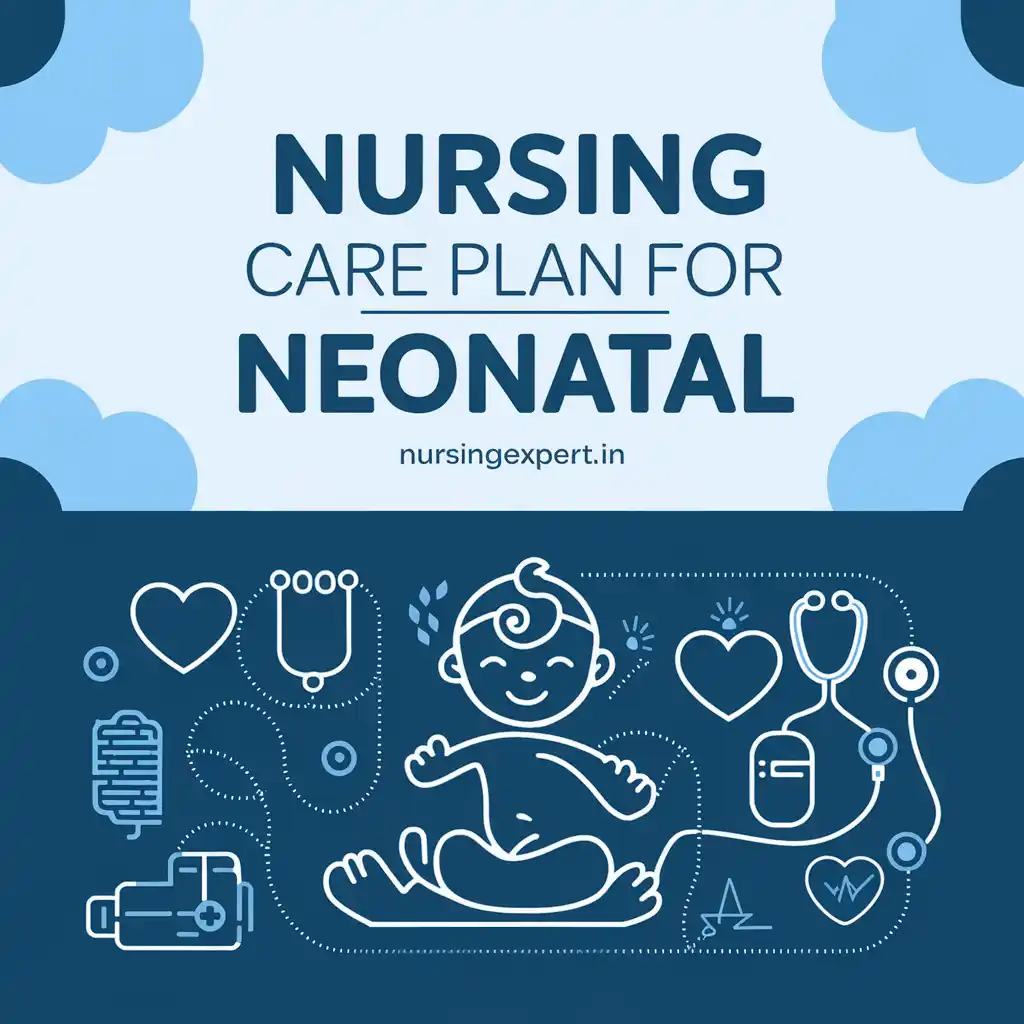Neonatal care requires a specialized approach to support the health and development of newborns. A well-structured nursing care plan for neonatal provides a clear roadmap for nurses to assess, intervene, and monitor the progress of these vulnerable patients. This comprehensive guide explains the key components of a nursing care plan for neonatal, offering practical strategies and evidence-based interventions to improve outcomes. A downloadable Nursing Care Plan for Neonatal PDF is available for quick reference during clinical practice or exam preparation.
Thank you for reading this post, don't forget to subscribe!
1. Introduction
Neonatal care plays a crucial role in supporting the fragile health of newborns. Nurses use a nursing care plan for neonatal to provide structured, evidence-based care that addresses the unique needs of infants during the first few weeks of life. This guide presents a detailed overview of neonatal care planning. It explains how to assess newborns, set measurable goals, and implement targeted interventions. With a downloadable PDF version available, this resource serves as an essential tool for both clinical practice and exam preparation.


2. Understanding Neonatal Care
Neonatal care focuses on the health and development of newborns immediately after birth. It involves continuous monitoring of vital signs, feeding, thermoregulation, and overall development. A robust nursing care plan for neonatal guides the nurse through the unique challenges faced by these patients. Early intervention is vital, as newborns have immature organ systems and are at high risk for complications.
Neonatal care plans are designed to ensure that newborns receive timely and appropriate care. These plans cover routine assessments, the management of acute conditions, and the long-term support required for healthy development. By following a structured care plan, nurses can better identify risks and respond promptly to changes in a newborn’s condition.
3. Pathophysiology of Neonatal Conditions
Newborns face several physiological challenges due to their immature systems. For instance, respiratory distress may occur because of underdeveloped lungs, and feeding difficulties can result from a weak sucking reflex. In the context of a nursing care plan for neonatal, understanding these physiological processes is essential.
When a newborn has respiratory issues, the alveoli and airways may not function optimally. This leads to insufficient oxygenation and can cause apnea or labored breathing. Similarly, inadequate gastrointestinal function may lead to poor absorption of nutrients, resulting in weight loss or malnutrition. By grasping these pathophysiological mechanisms, nurses can implement interventions that support each vital system and promote overall health.
4. Etiology of Neonatal Health Issues
Neonatal health problems can arise from various factors:
- Prematurity: Preterm infants often have underdeveloped lungs, digestive systems, and immune responses.
- Infections: Newborns are vulnerable to bacterial and viral infections that can lead to sepsis or other complications.
- Congenital Abnormalities: Genetic factors may cause structural or functional defects.
- Maternal Factors: Poor maternal nutrition, infections during pregnancy, or complications during delivery can affect neonatal health.
- Environmental Exposures: Exposure to toxins or inadequate care immediately after birth may impact a newborn’s development.
Understanding the causes of neonatal issues helps nurses tailor the nursing care plan for neonatal to meet the specific needs of each infant.
5. Signs and Symptoms in Neonates
Early identification of neonatal issues is key to successful intervention. Common signs and symptoms in neonates include:
- Respiratory Distress: Irregular breathing, apnea, or a grunting sound.
- Temperature Instability: Low body temperature (hypothermia) or difficulty maintaining warmth.
- Feeding Difficulties: Poor sucking, decreased appetite, or vomiting.
- Weight Loss: Inadequate weight gain or weight loss.
- Lethargy: Reduced responsiveness or overall weakness.
- Jaundice: Yellowing of the skin and eyes due to high bilirubin levels.
- Irritability: Excessive fussiness or inconsolable crying.
Recognizing these signs helps nurses use their nursing care plan for neonatal effectively to implement early and appropriate interventions.
6. Nursing Diagnosis for Neonatal Care
Nursing diagnoses form the foundation of any nursing care plan for neonatal. Based on NANDA guidelines, common nursing diagnoses in neonatal care include:
- Impaired Gas Exchange related to respiratory distress as evidenced by irregular breathing and low oxygen saturation.
- Imbalanced Nutrition: Less Than Body Requirements related to poor feeding and malabsorption as evidenced by weight loss and low nutritional markers.
- Ineffective Thermoregulation related to an immature physiological system as evidenced by unstable body temperature.
- Risk for Infection related to an immature immune system and exposure to invasive procedures.
- Ineffective Health Management related to parental uncertainty and lack of knowledge regarding neonatal care.
These diagnoses help focus the nursing care plan for neonatal on addressing critical issues and guiding interventions.
7. Nursing Interventions for Neonatal Care
Nursing interventions for neonatal care are designed to stabilize and support the newborn’s development. Effective interventions include:
- Respiratory Support:
Provide oxygen therapy and monitor respiratory status closely. Use devices like CPAP if needed to support proper gas exchange. - Nutritional Support:
Encourage breastfeeding or appropriate formula feeding. Work with a dietitian to ensure the newborn receives a high-calorie, nutrient-dense diet that supports growth. - Thermoregulation:
Maintain a neutral thermal environment using incubators or radiant warmers. Monitor the newborn’s temperature frequently to ensure stability. - Infection Prevention:
Apply strict aseptic techniques during procedures. Monitor for signs of infection and administer prophylactic antibiotics when indicated. - Pain Management:
Administer pain relief as prescribed for any discomfort that may interfere with feeding or growth. Use non-pharmacological methods such as swaddling or skin-to-skin contact to soothe the newborn. - Parental Education:
Teach parents proper techniques for feeding, temperature management, and hygiene. Educate them about the signs of distress and when to seek help. - Monitoring and Follow-Up:
Continuously monitor vital signs, weight, and developmental milestones. Adjust the care plan based on ongoing assessments.
These interventions form an integral part of the nursing care plan for neonatal and help ensure comprehensive care.
8. Nursing Management Strategies
Effective management of neonatal care involves both immediate and long-term strategies:
- Initial Assessment:
Conduct comprehensive assessments immediately after birth. Evaluate vital signs, feeding patterns, temperature, and respiratory function. - Ongoing Monitoring:
Regularly check vital signs, weight, and laboratory values. This helps track the newborn’s progress and adjust the care plan as needed. - Patient and Family Education:
Provide continuous education to empower parents with the knowledge required for proper care. Use visual aids, written materials, and hands-on training. - Interdisciplinary Collaboration:
Work with neonatologists, dietitians, respiratory therapists, and social workers to deliver a holistic care plan. Collaborative efforts ensure all aspects of the newborn’s health are addressed. - Follow-Up Care:
Schedule regular follow-up visits to monitor the newborn’s growth and development. Adjust interventions based on clinical findings and feedback from the family.
These strategies help optimize the nursing care plan for neonatal and support healthy development.
9. Patient and Family Education
Educating parents is essential in neonatal care. Key topics include:
- Understanding Neonatal Needs:
Explain the unique challenges faced by newborns, including feeding difficulties and temperature regulation. - Feeding Techniques:
Provide guidance on proper breastfeeding or formula feeding techniques. Teach parents how to recognize signs of hunger and fullness. - Thermoregulation:
Instruct parents on maintaining a neutral thermal environment, whether at home or in the hospital. - Infection Prevention:
Emphasize the importance of handwashing and hygiene to protect the newborn from infections. - When to Seek Medical Help:
Identify warning signs such as irregular breathing, temperature instability, or poor feeding that require prompt medical attention. - Follow-Up Care:
Stress the importance of regular check-ups and follow-up visits to monitor growth and development.
Clear, consistent education enables parents to manage neonatal care effectively and contributes to improved outcomes.
10. Interdisciplinary Collaboration
A team approach is essential in neonatal care. Nurses should collaborate with:
- Neonatologists:
To oversee the overall health and treatment plans for newborns. - Dietitians:
To develop tailored nutritional plans that address the specific needs of each infant. - Respiratory Therapists:
To assist with oxygen therapy and respiratory support. - Pharmacists:
To manage medication schedules and prevent drug interactions. - Patient Educators:
To provide additional training on self-care and newborn management. - Social Workers:
To connect families with community resources and support services.
Collaboration among these professionals ensures a comprehensive, patient-centered approach that optimizes care for neonates.
11. Sample Nursing Care Plan for Neonatal
The following table presents a sample nursing care plan for neonatal care. This plan organizes the process into clear, actionable sections.
| Assessment | Nursing Diagnosis | Goal/Expected Outcome | Intervention/Planning | Implementation | Rationale | Evaluation |
|---|---|---|---|---|---|---|
| Subjective Data: – Parent reports poor feeding and lethargy. Objective Data: – Low weight gain; weak sucking reflex; decreased responsiveness. | Imbalanced Nutrition: Less Than Body Requirements related to inadequate feeding as evidenced by weight loss and poor intake. | Short-Term: – Within 48 hours, the newborn will consume small, frequent meals. Long-Term: – The newborn will achieve steady weight gain and improved energy levels. | Develop a structured feeding plan with a dietitian; educate parents on effective feeding techniques. | Assist with feeding; monitor weight daily; provide nutritional supplements as prescribed. | Adequate nutrition supports growth and energy levels in newborns. | Weight gain stabilizes; feeding improves; lab markers reflect better nutrition. |
| Subjective Data: – Parent reports episodes of apnea and irregular breathing. Objective Data: – Irregular respiratory patterns; low oxygen saturation; signs of respiratory distress. | Impaired Gas Exchange related to respiratory distress as evidenced by irregular breathing and low oxygen saturation. | Short-Term: – Within 1 hour, oxygen saturation improves and respiratory rate normalizes. Long-Term: – The newborn maintains stable respiratory function with effective gas exchange. | Initiate oxygen therapy and monitor respiratory status closely; adjust oxygen delivery as needed. | Provide supplemental oxygen; monitor saturation continuously; reassess respiratory patterns frequently. | Supporting gas exchange is vital for overall health and development. | Oxygen levels improve; respiratory distress decreases; clinical signs stabilize. |
| Subjective Data: – Parent expresses concern about temperature fluctuations. Objective Data: – Low body temperature; signs of thermal instability. | Ineffective Thermoregulation related to immature physiological systems as evidenced by low body temperature. | Short-Term: – Within 1 hour, the newborn’s temperature stabilizes within normal range. Long-Term: – The newborn maintains a stable body temperature with ongoing care. | Use an incubator or radiant warmer to maintain a neutral thermal environment; monitor temperature regularly. | Adjust incubator settings; monitor temperature every 15 minutes; provide skin-to-skin contact if appropriate. | Stable temperature supports metabolic function and overall growth. | Temperature stabilizes; thermal regulation improves; parents report increased comfort. |
| Subjective Data: – Parent appears anxious about managing newborn care. Objective Data: – Parent asks questions and shows uncertainty in care practices. | Ineffective Health Management related to insufficient knowledge about neonatal care as evidenced by parental anxiety and inconsistent care. | Short-Term: – Within 24 hours, the parent will verbalize key aspects of newborn care. Long-Term: – The parent will consistently follow the care plan and attend follow-up appointments. | Develop an education plan that includes clear instructions on newborn care; use visual aids and written materials. | Conduct individual teaching sessions; provide handouts; schedule regular reviews to reinforce learning. | Education empowers parents to manage their newborn’s care effectively. | Parent demonstrates understanding; adherence to the care plan improves; follow-up visits confirm consistency. |
12. Downloadable Nursing Care Plan for Neonatal PDF Download
Nursing Care Plan for Neonatal PDF Download
Access our complete nursing care plan for neonatal PDF download. This comprehensive resource provides detailed, step-by-step instructions, NANDA-based nursing diagnoses, targeted interventions, and patient education strategies to manage neonatal care effectively. Use this resource for clinical practice or exam preparation.
13. Frequently Asked Questions (FAQs)
- What is neonatal care?
Neonatal care focuses on the health and development of newborns during the first few weeks of life. - What common challenges are faced in neonatal care?
Common challenges include respiratory distress, feeding difficulties, temperature instability, and risk of infection. - What is the main goal of a nursing care plan for neonatal?
The goal is to stabilize the newborn, support growth and development, and prevent complications through targeted interventions. - Which interventions are most effective in managing neonatal care?
Effective interventions include respiratory support, nutritional guidance, thermoregulation, infection prevention, and parental education. - How do nurses evaluate the success of a neonatal care plan?
Nurses assess improvements in vital signs, weight gain, feeding patterns, and overall developmental progress.
14. Conclusion
A structured nursing care plan for neonatal is vital for ensuring healthy development and stabilizing fragile patients. By using targeted interventions, continuous monitoring, and effective education, nurses can significantly improve neonatal outcomes and support a smooth transition to postnatal life.
15. References and Sources
- Mayo Clinic. (2023). Newborn Care: Overview and Guidelines. Retrieved from https://www.mayoclinic.org/healthy-lifestyle/infant-and-toddler-health
- MedlinePlus. (2023). Neonatal Care. Retrieved from https://medlineplus.gov/neonatalcare.html
- NANDA International. (2022). NANDA Nursing Diagnoses: Definitions and Classifications. Retrieved from https://www.nanda.org/
- American Academy of Pediatrics. (2023). Neonatal Guidelines. Retrieved from https://www.aap.org
- Centers for Disease Control and Prevention (CDC). (2023). Maternal and Infant Health. Retrieved from https://www.cdc.gov/reproductivehealth/maternalinfanthealth/index.html


